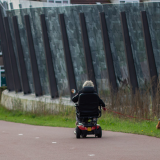
Usługi publiczne
Usługi publiczne, takie jak ochrona zdrowia, edukacja, opieka społeczna i transport są niezbędne do osiągnięcia wysokiego poziomu ochrony socjalnej, spójności i integracji społecznej. Biorąc pod uwagę zmieniające się warunki społeczne i demograficzne, kluczowe znaczenie ma jakość i dostępność tych usług.
Wyzwaniem dla decydentów jest zapewnienie obywatelom takich usług zdrowotnych i socjalnych, które zaspokoją ich różnorodne potrzeby. W ostatnich latach było to tym większym wyzwaniem, że trzeba było uporać się z poważnymi trudnościami finansowymi i rosnącym zapotrzebowaniem na tego rodzaju usługi, związanymi ze starzeniem się ludności oraz z napływem uchodźców do Europy. Poza dostępnością i jakością, pojawiają się także nowe problemy. Jednym z nich jest ryzyko, że nowe, cyfrowe kanały dystrybucji usług mogą izolować społeczności już teraz znajdujące się w niekorzystnej sytuacji. Trzeba liczyć się z wystąpieniem trudności w zapewnieniu określonego standardu dostępu do odpowiedniej jakości usług.
Pakiet inwestycji społecznych Komisji, który ogłoszono w 2013 r., wzywa państwa członkowskie do położenia większego nacisku na wysokiej jakości usługi publiczne. Przyjęta w 2015 r. strategia Komisji dotycząca jednolitego rynku cyfrowego dla Europy koncentruje się z kolei na modernizacji usług publicznych w celu zwiększania ich konkurencyjności. Wykorzystanie nowych technologii, internetowe usługi publiczne i transgraniczna interoperacyjność mają decydujące znaczenie dla podniesienia efektywności kosztowej i jakości usług. W kwietniu 2017 r. Komisja uruchomiła europejski filar praw socjalnych, w którym nacisk położono na zapewnienie dostępu do wysokiej jakości kształcenia, wczesnej edukacji i opieki nad dzieckiem, opieki zdrowotnej, mieszkalnictwa socjalnego i innych podstawowych usług.
- Komisja Europejska: Pakiet inwestycji społecznych
- Komisja Europejska: Jednolity rynek cyfrowy
- Komisja Europejska: Europejski filar praw społecznych

















